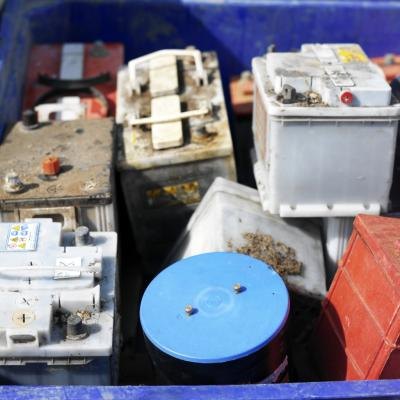Saturday, October 5, 2013
What Are the Causes of Corroded Battery Cables

Battery cable corrosion occurs for many reasons, not the least of which is oxidation, a process hard on humans and metal objects. This especially applies to batteries and cables that add corrosive acids and chemicals to the mix. Besides the composition of the battery, another consideration is the battery posts and cables. Mixing dissimilar metals or certain metals together quickly leads to corroded battery cables.
Galvanic Corrosion
A major cause of corroded cables is the mixing of two dissimilar metals when securing the cable to the battery post, which creates a galvanic reaction between the two metals. Three things must be present for this type of reaction: two dissimilar metals with different electrochemical signatures; an electrical path; and a path for metal ions to move from one metal to the cathodic metal. With this two-way path available -- which is how car batteries work when immersed in an electrolytic solution such as sulfuric acid -- a miniature battery develops with current flowing in one direction and the metal ions moving to the stronger metal. This process forms the corrosion seen around the batterys post and cable end.
Battery Fumes
Any kind of venting of battery fumes in or around the battery cables will cause corrosive buildup on the cable ends. This happens when battery cell covers arent secured tightly, or theres a crack in the battery casing, allowing fumes to escape. When corrosion occurs, your battery has to work harder to provide the amperage necessary to start the car. Corrosion that continues to grow can make its way inside the battery and effectively destroy its ability to hold a charge.
Battery Acid
A cars battery contains acid. Besides helping the battery work to store electricity, sulfuric acid acts as a catalyst for corrosion. The acid, when combined with the environment under the hood -- anti-freeze fumes, grease, oil, humidity, dirt and oxygen -- accelerates the corrosion process. Battery cables made from copper are particularly susceptible to corrosion when in contact with sulfuric acid and oxygen.
Prevention
To aid in prevention, ensure cable ends are the same metal as the battery posts. Clean the battery posts with a metal terminal cleaner. For tough cases, use a water-and-baking soda mixture to remove the corrosion, but dont let this concoction enter the battery; this will cause battery failure. Use the brush end of a battery terminal cleaner to hone out the inside of battery cables. After cleaning, apply dielectric grease to the battery posts and cable ends to prevent corrosion buildup. Replace any battery cables that have exposed wires or tears in the sheathing -- these promote corrosion where you cant see it, inside the sheathing itself.
Safety First
When working with a battery, practice safety. Dont smoke around batteries, especially those with the cell covers off; this could lead to explosions. Dont over-tighten battery cable ends -- you could break battery posts. And remove the negative terminal connection before removing the positive to avoid sparks that can ignite fumes.
No comments:
Post a Comment